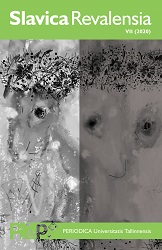On Some Contexts and Subtexts of Nabokov’s Podvig
On Some Contexts and Subtexts of Nabokov’s Podvig
Author(s): Alexander DolininSubject(s): Novel, Russian Literature, Interwar Period (1920 - 1939)
Published by: Tallinna Ülikooli Kirjastus
Keywords: 20th-Century Russian Literature; Vladimir Nabokov (1899—1977); Podvig (1932); Subtext; History of Literature;
Summary/Abstract: The article interprets the plot and main themes of Vladimir Nabokov’s Podvig (Glory, in an imprecise English translation) as an expression of his belief in the heroic potentialities of the modern age. Nabokov plays upon different meanings and connotations of the Russian title word that can mean “high deed” (alluding to the protagonist’s suicidal expedition to communist Russia) but also “path,” “way,” “journey,” and, ultimately, “life” (alluding to his life as a kind of quest). The subtexts of the novel are taken from Russian folklore and poetry, developing upon the motive of “stony path” that originates from Lermontov’s famous “Vykhozu odin ia na dorogu…” (1841) and its echoes in Blok and Mandelshtam.
Journal: Slavica Revalensia
- Issue Year: 2020
- Issue No: 7
- Page Range: 37-52
- Page Count: 16
- Language: English

